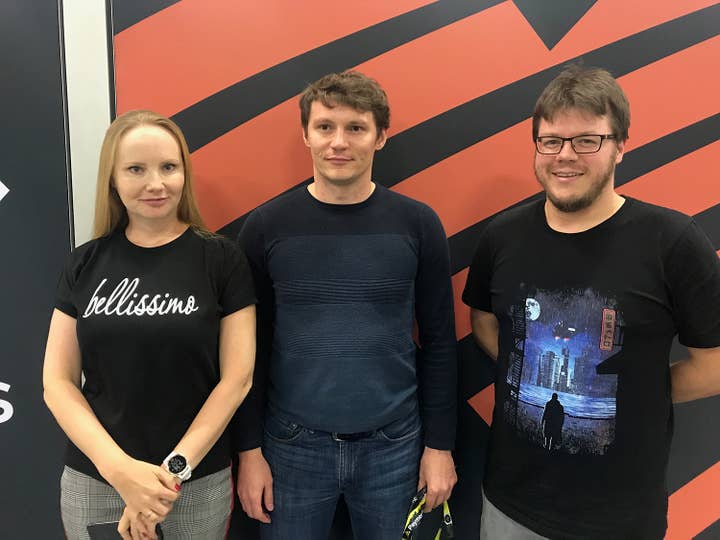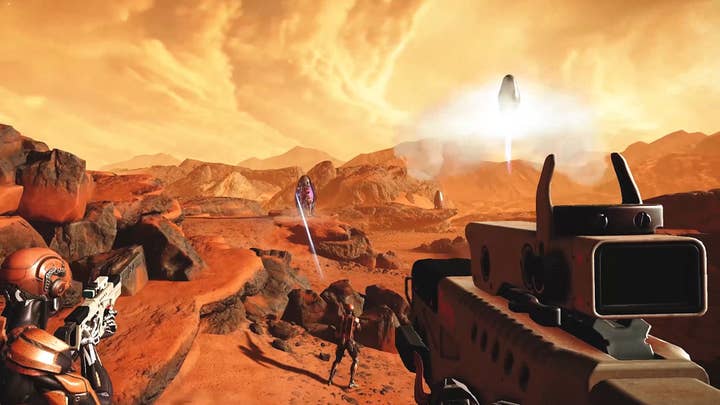The (not) new Russian games store taking on Epic and Steam
My.Games on how a 70/30 split and lack of exclusives won't prevent it from making "the best platform ever"
My.Games isn't Mail.Ru's first stab at expanding into the global games industry.
The Russian internet giant has made a couple of attempts at reaching Western audiences over the years, but the recent rebrand and announcement of a new digital storefront for PC games indicate that the firm's ambitions have grown significantly.
Calling the My.Games Store 'new' isn't strictly accurate. It has already been running a PC platform in Russia for over a decade, with millions of local gamers logging in every month. But My.Games West's general manager Volker Boenigk says the company has adopted "a fresh name for a fresh start."
"For us, this is not a new business because in terms of the platform, we've been developing the business in Russia for more than ten years," marketing director Elena Grigoryan adds during an interview at Gamescom.
"We're successfully competing with Steam [at home] already. We're now trying to use our knowledge to expand the business outside of Russia"
Elena Grigoryan, My.Games
"Our monthly active users is pretty impressive; it's about 13 million in Russia and these figures are pretty close to the audience for Steam. We're successfully competing with Steam [at home] already. We're now trying to use our knowledge to expand the business outside of Russia. So we're not a new player in the market."
She goes on to say that, while My.Games certainly specialises in the Russian market, it has already been releasing games globally for years. With ten regional offices outside of Russia, it has extensive experience of reaching Western and even Asian audiences.
"We have a lot of knowledge about how to communicate and how to work with global audiences already from our publishing and development segments," she says. "We know a lot about the audience outside of Russia already. Our knowledge of that audience will be applicable."
Boenigk believes the company's experience as a developer and publisher, as well as running a marketplace, gives it a distinct advantage when it comes to rolling out a new PC store for the West.
"What we're trying to build is a platform that combines all our learnings and our knowledge about the issues we've encountered, because we publish games on Steam, on PlayStation, on Xbox," he says.
"I will use our platform like any publisher would. Of course, I'm closer to the team that [built it], but it's going to benefit both of us because I'll actually come out it with a publisher's view of what works and doesn't work for me. And I can immediately work with the team on resolving that, and all the other developers will be able to benefit from any changes we internally figure out.

"We want to build something that's really a great foundation for developers to come and bring their games to our users -- in the West and in Russia -- and at the same time take all the cool features of our integrated, interconnected service for users and bring that to the West as well."
My.Games is keen to emphasise that these user features will help it compete with the likes of Steam and the Epic Games Store. The marketplace will have plenty of systems that today's PC players have come to expect -- chat, friends lists, achievements -- as well as some more advanced functions for core players.
"Lots of platforms still use a 70/30 split -- it's still a standard. We need to start from something. We're not saying it's forever, it could be changed later"
Rodion Kotelnikov, My.Games
For example, the platform's Lootdog service allows users to trade in-game items with each other for real money, while Donation Alerts is one of the tools it has devised to help players monetise their livestreams. Having already proved popular in Russia, Boenigk believes these will help engage PC owners in the West. After all, where there are local differences between various markets -- some regions will have a higher demand for the item trading than others -- "at the core we're still talking about gamers."
It's clear that user experience is a top priority for My.Games, and speaks to some of the controversy Epic has attracted with its own game store. Having launched back in December 2018, the Fortnite firm continues to come under fire for lacking some of the features Steam offers -- an issue Boenigk believes My.Games will avoid, although he notes not everything will be available at launch.
"At first, it's going to be a gradual process for us as well," he admits. "We won't be throwing all the features that we've ever had into the Western market on day one, but we'll introduce them step-by-step. We're aware of the features that Steam has, both on the user side and developer support side, and the same for Epic Store. We'll be looking closely at what's important to bring out first.
"We'll also try to be transparent about what's available for the Russian audience and what will come to the Western market, and when. We have that advantage, we have these years of features that are already built, that are very clear and exist. It's not that we would create a roadmap out of just our imagination of what we'd like to do. The features are there, it's just we'll bring them step-by-step to make sure everything works as it should."
Another distinct difference -- perhaps a disadvantage -- between My.Games and the Epic Games Store is the revenue split for developers. Epic famously championed an 88/12 share in favour of the developer, bucking Steam's long-established 70/30. Valve pre-empted this by introducing a tiered system based on a game's success, with the biggest selling titles able to adopt an 80/20 split.
Yet My.Games is launching with the 70/30 ratio -- a system recently described as "outrageous" by Paradoix's Fredrik Wester and "quite frankly anachronistic" by Koch Media CEO Klemens Kundratitz.

"But lots of platforms still use that split -- it's still a standard," argues Rodion Kotelnikov, head of My.Games Store. "Steam uses it, the consoles use it. We need to start from something. We're not saying it's forever, it could be changed later, but we're just not announcing anything about that now."
Again, the team reiterates its position as a publisher, suggesting those who sign with My.Games will have the option of custom revenue splits. Grigoryan dubs 70/30 as the "starting point of the discussion."
"We're ready to be flexible and we already have different splits with some of our partners," she says. "We understand the current standard is not [the only option], having the Epic Store on the marketplace, so that's why we decided to start from this point but to be flexible on a case-by-case basis."
"We're trying to build a platform that combines all our learnings about the issues we've encountered as a publisher on Steam, PlayStation and Xbox"
Volker Boenigk, My.Games
Kotelnikov emphasises that, in stark contrast to Epic, My.Games is not actively pursuing or demanding exclusive rights. Even its own titles, like Conqueror's Blade and Warface, are available via Steam.
"We have a unique audience -- at least in Russia, we have a lot of people who are only playing our games on our platform," he explains. "That's why I'm sure we can create additional revenue for developers. They can publish their games on other platforms and on ours, and earn more money than they would if it were only one one platform."
It's an interesting move, and one perhaps inspired by both the aggressive backlash Epic (and its partners) has received for such deals, and the lack of Fortnite-esque revenue to fund them. And it's something the team does not believe is necessary for the My.Games Store to establish a foothold in the West.
"My own opinion is it's very inconvenient for users when you need to install an additional launcher if you want to play specific games," says Kotelnikov. "In my perfect world, all the content is available on all the platforms, and platforms compete only on their services and the quality of their services, visibility, tools and so on. But of course we understand why Epic does this."
Boenigk admits the team was "torn" over the use of exclusives because "it's a valid business approach and a good strategy if you have the funds to do it." As a PC gamer himself, he notes that he already has multiple launchers so one more from Epic isn't a problem, but "having the freedom to choose where to play my games" is what's really important.
"It's a movement where we're seeing in that space we're moving towards the exclusivity and the fragmentation of the market," he says. "Whereas on consoles, we see they're doing the exact opposite, trying to bring players together with cross-platform play and things like that.
"[Exclusivity is] not the approach we have. The features of our platform, we want and hope that will be the value, for both the developers and the users. And then having all the great games there, perfect. If you want to play them on our site, great, here they are -- plus our cool features. You want to play them on Steam? We won't stop you."
The My.Games Store is due for launch in the West during Q4, with the company expected to share more details in the coming months. Once the store is live, of course, the real work begins; Kotelnikov tells us his team plans to spend several months communicating with the early adopters -- both players and developers -- to quickly identify potential areas for improvement.
"We'll try to develop our platform in both a developer-driven way and a user-driven way," he concludes. "We aim to make the best platform ever."
